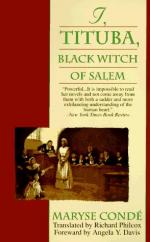
|
Objective
Objective: Forward Tituba's trial for witchcraft was in the 1600s, during a time where discrimination was the norm. Discrimination is a significant theme in the text because Tituba's experiences with white Christian men all seem to fall to discrimination. Christianity in the 1600s in Salem was stern, rigid, and Puritanical. There was no room for Tituba's mysticism, as it would be considered dealing with Satan. Tituba is unable to retain her identity when she lives in Salem. She does not get to explore three of her identities in terms of race, religion, or gender. This lesson will explore discrimination as a theme in the text.
1. Class Discussion: Based on the reader's first impression, why is Tituba discriminated against? What kinds of relationships lead to discrimination for Tituba? What role did spirituality play in discrimination against Tituba? What role do Tituba's different identities play in the discrimination against...
|
This section contains 7,219 words (approx. 25 pages at 300 words per page) |

|




